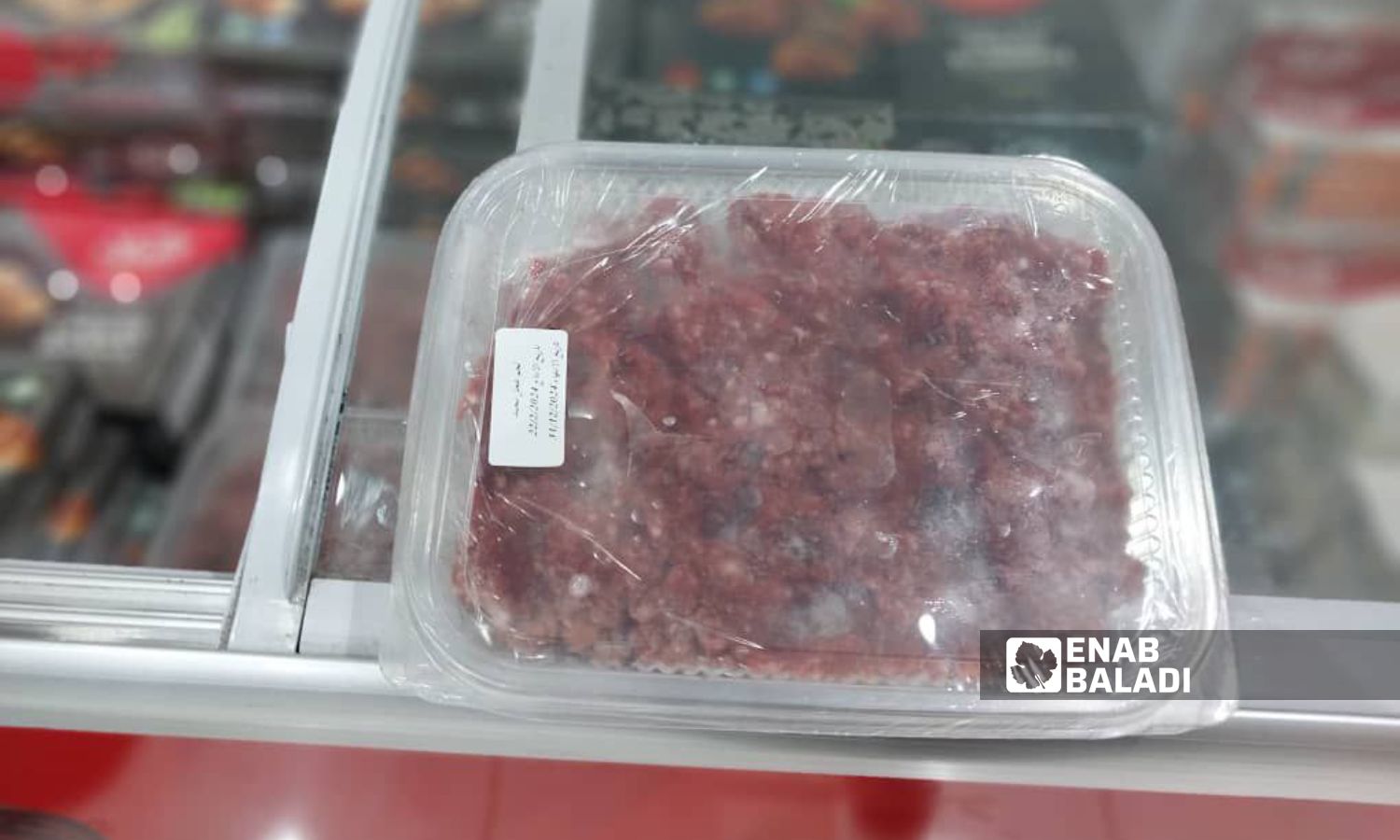



Enab Baladi – Sarah al-Ahmad
Since the beginning of the current year, the prices of red meat have seen a significant increase in the markets of Daraa governorate.
The price of a kilo of sheep meat reached 210,000 Syrian pounds, and a kilo of beef to 200,000 pounds, figures that are close to the minimum wage for workers in areas under regime control.
The price hike affected the buying and selling movement in the meat markets, prompting shop owners to purchase frozen beef from Jordan and bring it into Daraa governorate through taxi drivers who operate in transporting goods between Jordan and Syria.
Enab Baladi monitored the prices of frozen meat in the markets of Daraa city, where the price of a kilo of frozen beef reached about 100,000 Syrian pounds, sold in half-kilogram packaged boxes, and is preserved in the refrigerator for long periods.
Reem al-Hassan (32 years old), a resident of the Golan camp in Daraa city, told Enab Baladi that the low living conditions and the weak income of her husband, whose monthly salary reaches 350,000 pounds, have greatly affected their ability to purchase fresh meats.
The young woman considered that frozen meats have become a good replacement for fresh meats due to their lower prices, allowing families to buy half a kilo of frozen meat monthly instead of the previous non-availability.
The taste of frozen meats differs from fresh ones, but they are acceptable and take a longer time to cook.
Mohamed al-Taani (52 years old), a resident of the Yarmouk suburb, told Enab Baladi that his family was initially apprehensive about buying frozen meats, especially since they are minced and not in pieces, but the lower prices made them a suitable protein alternative on the table.
Haitham al-Abazaid, a frozen meat shop owner in Daraa city, told Enab Baladi that most of the frozen meats are brought in from Jordan to Daraa governorate. Taxi drivers introduce it through the Nassib border crossing, after placing it inside medium-sized refrigerators. It is then unloaded in the village of Nassib and distributed to merchants by request.
Al-Abazaid explained that the introduction of meats has doubled in the past two months along with many other consumable items, due to the increased demand for them in the local markets.
Al-Abazaid considers that these meats come from “reliable” sources, as they are imported to Jordan from the Gulf countries or European countries, and their quality is verified, with their expiry dates placed on the outer packaging.
They are sold in Jordan at the same price as in Syria, about five dinars, equivalent to 100,000 pounds per kilo, but Syrian merchants buy them for two dinars less from Jordan to be sold in Syria at a good profit.
Frozen meats do not lose their nutritional value as they retain proteins and minerals, according to a doctor who works in Daraa city, who requested anonymity for personal reasons.
However, this depends on freezing them at the appropriate storage temperature, as freezing helps to prevent the growth of various microorganisms and microbial activity, which helps to preserve food from spoilage.
The most important thing, the doctor mentioned, is to ensure the source of frozen meats, especially minced meats, which cannot be distinguished by type.
The Syrian regime’s government prohibits the importation of frozen meats, despite repeated demands to allow it due to their lower prices.
The president of the Consumer Protection Association in Damascus and its countryside, Abdul Aziz al-Maqali, called on the government to allow the importation of frozen red meats and fish given the shortage in livestock and the insane increase in prices.
Al-Maqali stated in a press interview, in December 2023, that the costs of importing meats and fish are significantly lower than the costs of raising them, along with the unavailability of production requirements and their high prices.
if you think the article contain wrong information or you have additional details Send Correction